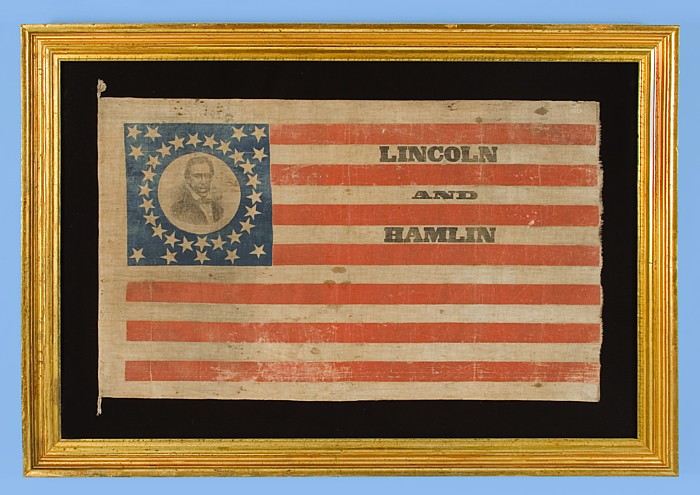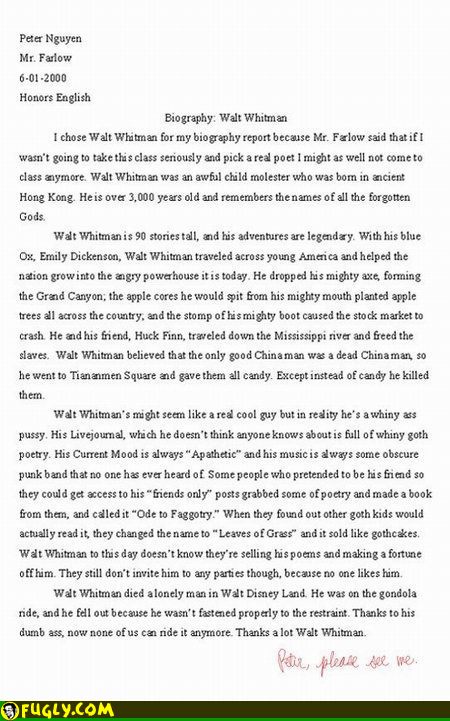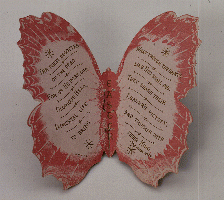
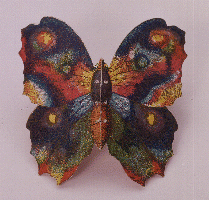
Photo Credit: Library of Congres Archives
After the attack on Pearl Harbor, the Library of Congress in Washington, D.C. boxed up nearly 5,000 crates of historical documents, including the Walt Whitman Archives, and sent them to different areas for safekeeping until the war ended. Upon their return it appeared that one of the crates had been penetrated, and ten of Walt Whitman’s notebooks and his cardboard butterfly were missing. Donated in 1918, the collection consists of poetry and prose manuscripts, letters, notes and notebooks, proofs, etc, written by Whitman throughout his literary career.
February 24, 1995 four of the notebooks and the cardboard butterfly were returned when a young man brought them to Sotheby’s to be appraised, claiming they were from his father’s estate. These notebooks are still quite a mystery, as six of the ten are still missing. However, since the recovery of the first four and the cardboard butterfly, their images have been scanned in order to preserve them, and have been made available online through the Library of Congress.
These notebooks and the cardboard butterfly are vastly important to the literary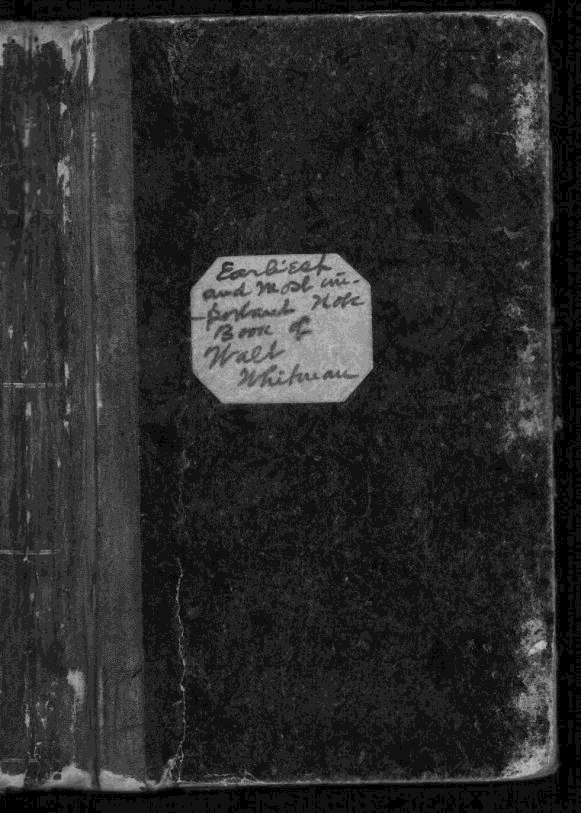 world. “It is safe to estimate that Whitman created at least one hundred notebooks of greatly varying sizes and descriptions” (Birney). Whitman had many notebooks, some hand crafted and small enough to fit in his pack, which he used on a regular basis throughout his career to jot down parts of his poetry and prose, and to remember experiences vividly that he wanted to use to recapture in later poems. The contents of the notebooks are quite valuable and historically important because they are the hand written notes from the poet himself. Many of the notes are written by Whitman during his Civil War years, including “cryptic observations on life on the battlefield and death in Civil War hospitals, and detailed notes such as a reporter would make for later reference”(Fineberg).
world. “It is safe to estimate that Whitman created at least one hundred notebooks of greatly varying sizes and descriptions” (Birney). Whitman had many notebooks, some hand crafted and small enough to fit in his pack, which he used on a regular basis throughout his career to jot down parts of his poetry and prose, and to remember experiences vividly that he wanted to use to recapture in later poems. The contents of the notebooks are quite valuable and historically important because they are the hand written notes from the poet himself. Many of the notes are written by Whitman during his Civil War years, including “cryptic observations on life on the battlefield and death in Civil War hospitals, and detailed notes such as a reporter would make for later reference”(Fineberg).
Deemed the father of free verse, these notebooks are so important because one can see jus t by looking at the pages how much Whitman revised, worked, and re-worked, crossed out, and added to his own work. The mastery of his genius can be seen through his constant revisions, and how every word of his work was toiled over until he deemed it fit. These notebooks contain notes of wounded soldier’s needs, which he used to create his prose work on the Civil War. Alice L. Birney, an American literature specialist in the Manuscript division said of the notebooks, “These notebooks are the primary record of the poet’s very early career, while he was a journalist (during the 1840s), and during his years in Washington while he was a volunteer nurse in the Civil War” (Fineberg). 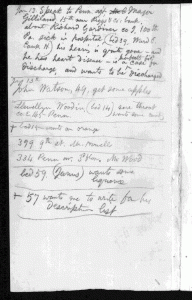 The importance of these notes can be seen when reading Whitman’s prose of the Civil War, and the stories he provides of the soldiers and their wants. “In these he noted what treats a soldier might like on the next visit — raspberry syrup, rice-pudding, notepaper and pencil — or notes and addresses of family to whom Whitman would then write in place of the gravely wounded or dead young man. Occasionally he would also describe scenes on the battle-field, probably from reports from others in the camps” (Birney). When one reads Whitman’s prose he sees the story told of the soldier who craved rice-pudding, and how Whitman’s recounts writing letters for the soldiers to send home. It is interesting to see how his prose developed from the simple notes he collected from his war-time experiences, to the moving tales he prints later.
The importance of these notes can be seen when reading Whitman’s prose of the Civil War, and the stories he provides of the soldiers and their wants. “In these he noted what treats a soldier might like on the next visit — raspberry syrup, rice-pudding, notepaper and pencil — or notes and addresses of family to whom Whitman would then write in place of the gravely wounded or dead young man. Occasionally he would also describe scenes on the battle-field, probably from reports from others in the camps” (Birney). When one reads Whitman’s prose he sees the story told of the soldier who craved rice-pudding, and how Whitman’s recounts writing letters for the soldiers to send home. It is interesting to see how his prose developed from the simple notes he collected from his war-time experiences, to the moving tales he prints later.
Moreover, the notebooks also contain the early workings of “Song Of Myself”. In Fineberg’s article she says that Sotheby’s claims, “the more important of the four recovered notebooks is the earliest, dated 1847, which contains about 47 small leaves densely written in pencil with aphorism, observations, and extensively revised poetry, including early drafts of “Song of Myself”.
Through these drafts we can see Whitman’s different techniques in revising his poetry, and we can see visually how his poetry unfolded, from first drafts, to revisions, to the final versions that are still being printed today.
As far as the cardboard butterfly is concerned, its recovery is equally as important as the recovery of the notebooks. Whitman liked to portray himself as one with nature. Whitman clearly had a fondness for butterflies, as seen in the photos of Whitman holding his hand out with a butterfly perched upon his finger. “He used the butterfly-on-hand as a recurring motif in his books and intended for this photo to be reproduced as the frontispiece in this sample proof of Leaves from 1891” (Curtis).
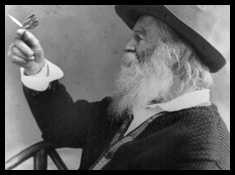
Photo Credit: Charles E. Feinberg Collection, Library of Congress
Whitman claimed the butterfly was real. “Yes–that was an actual moth,” he told Traubel; “the picture is substantially literal: we were good friends: I had quite the in-and-out of taming, or fraternizing with, some of the insects, animals.” Whitman told the historian William Roscoe Thayer, “I’ve always had the knack of attracting birds and butterflies and other wild critters” (Folsome and Genoways). Although it is known that the butterfly was actually cardboard, as seen above, it is quite important to note Whitman’s attachment to nature and the physical world.
It is interesting to wonder what the impact of “Leaves of Grass” would have been had this been the frontispiece for the collection. As much as Whitman does explicate his love of nature and the physical world in parts of the collection, the major theme seems to be his love of humanity, America, and the unity of man. One wonders what the perception of the collection of poetry would have been had he used the above image in place of the picture that was used.
Printed on the cardboard butterfly is a hymn written by John Mason Neale, and on the opposing side is a vibrant coloring of the insect. The hymn bears no significance to Whitman’s poetry, and is merely a prop used for his photograph. It has been remarked that the believability of Whitman’s comment is non-existent, since he is sitting in a smoking jacket in an indoor studio, where the occurrence of a butterfly just passing through and landing on Whitman’s hand is unlikely. However, it is clear that the poet had a fondness for both photography and nature, and wanted his love of nature to be shown through the photo. Whether the butterfly was real or not is trivial when compared to the impact Whitman had through his poetry and through this photo. Still being displayed today, and being seen as a thing of value for the Library of Congress, Whitman’s cardboard butterfly and the notebooks that it resides with are clearly of great value to the scholarly world.
Works Cited
Birney, Alice L. “About Whitman’s Notebooks”. Library of Congress Manuscript Division. . http://memory.loc.gov/ammem/collections/whitman/wwntbks.html
Taylor, W. Curtis. “Whitman with Butterfly, 1877,”
Albumen photograph frontispiece in sample proof of Leaves of Grass, 1891. Rare Books and Special Collections Division. Library of Congress. <http://www.loc.gov/exhibits/treasures/images/ww0048p1s.jpg>.
Finberg, Gail. “LC’s Missing Whitman Notes Found in N.Y.”. The Library of Congress Gazette February 24, 1995. http://rs6.loc.gov/ammem/collections/whitman/gazette1.html
Folsom, Ed and Genoways, Ted. “’This Heart’s Geography’s Map’: The Photographs of Walt Whitman”. Virginia Quarterly. Spring 2005. http://www.vqronline.org/articles/2005/spring/genoways-this-hearts-geographys/
All Photos are credited to the Library of Congress Web Site


 world. “It is safe to estimate that Whitman created at least one hundred notebooks of greatly varying sizes and descriptions” (Birney). Whitman had many notebooks, some hand crafted and small enough to fit in his pack, which he used on a regular basis throughout his career to jot down parts of his poetry and prose, and to remember experiences vividly that he wanted to use to recapture in later poems. The contents of the notebooks are quite valuable and historically important because they are the hand written notes from the poet himself. Many of the notes are written by Whitman during his Civil War years, including “cryptic observations on life on the battlefield and death in Civil War hospitals, and detailed notes such as a reporter would make for later reference”(Fineberg).
world. “It is safe to estimate that Whitman created at least one hundred notebooks of greatly varying sizes and descriptions” (Birney). Whitman had many notebooks, some hand crafted and small enough to fit in his pack, which he used on a regular basis throughout his career to jot down parts of his poetry and prose, and to remember experiences vividly that he wanted to use to recapture in later poems. The contents of the notebooks are quite valuable and historically important because they are the hand written notes from the poet himself. Many of the notes are written by Whitman during his Civil War years, including “cryptic observations on life on the battlefield and death in Civil War hospitals, and detailed notes such as a reporter would make for later reference”(Fineberg).  The importance of these notes can be seen when reading Whitman’s prose of the Civil War, and the stories he provides of the soldiers and their wants. “In these he noted what treats a soldier might like on the next visit — raspberry syrup, rice-pudding, notepaper and pencil — or notes and addresses of family to whom Whitman would then write in place of the gravely wounded or dead young man. Occasionally he would also describe scenes on the battle-field, probably from reports from others in the camps” (Birney). When one reads Whitman’s prose he sees the story told of the soldier who craved rice-pudding, and how Whitman’s recounts writing letters for the soldiers to send home. It is interesting to see how his prose developed from the simple notes he collected from his war-time experiences, to the moving tales he prints later.
The importance of these notes can be seen when reading Whitman’s prose of the Civil War, and the stories he provides of the soldiers and their wants. “In these he noted what treats a soldier might like on the next visit — raspberry syrup, rice-pudding, notepaper and pencil — or notes and addresses of family to whom Whitman would then write in place of the gravely wounded or dead young man. Occasionally he would also describe scenes on the battle-field, probably from reports from others in the camps” (Birney). When one reads Whitman’s prose he sees the story told of the soldier who craved rice-pudding, and how Whitman’s recounts writing letters for the soldiers to send home. It is interesting to see how his prose developed from the simple notes he collected from his war-time experiences, to the moving tales he prints later.
